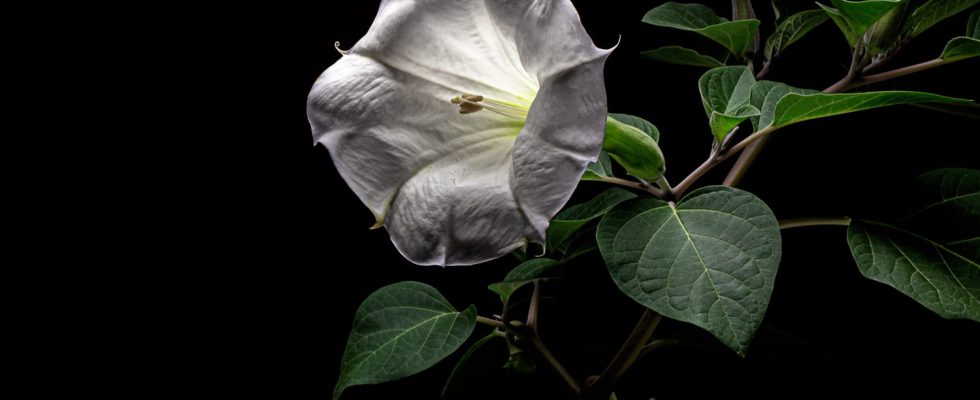Plant toxic because of the alkaloids it contains, the datura is used for recreational purposes, by people in search of psychotic effects. What are its effects ? Is there a risk of addiction? How to consume it without risk? Response elements.
What is the drug in datura?
Datura (Datura stramonium) is a poisonous plant found in fields. It has purple or white trumpet-shaped flowers. Those are the alkaloids it contains (mainly atropine and scopolamine) which are considered a drug. These substances, especially concentrated in the seeds, can be very toxic if ingested in large doses. Datura is usually eaten in the form of a decoction.
What are the effects of datura?
The alkaloids contained in datura have hallucinogenic effects whose intensity varies according to the quantity consumed. The datura in particular causes auditory, visual, tactile hallucinations, insensitivity to pain as well as a loss of spatio-temporal landmarks. “Datura is a plant that can have hallucinogenic effects but I have never heard of consumption in a patient of datura. It is a marginal phenomenon. Remember that today in France, we die of tobacco and alcohol, not of these “behavioral oddities” that are the fact of eating toxic plants. Datura is probably eaten by people looking for psychotic effects such as impulsive people, sensation seekers, or in a festive context, but there is no no frequency data concerning the datura“, comments Professor Michel Lejoyeux, head of the psychiatry and addictology department at Bichat hospital.
Is she toxic?
Datura, and more specifically the alkaloids it contains, can alter behavior, leading in particular to: restlessness, confusion, blurred vision, disorientation over time, dryness skin and mucous membranes. Datura can also be responsible for physical symptoms such as rapid heartbeat, confusion, aggression, excitement, seizures as well as a slowing down of the digestive system. This plant is endowed with a very powerful toxicity and can be deadly, even in small quantities.
Is it addictogenic?
“The datura does not cause not to my knowledge of addiction. International classifications do not identify addiction to datura“, indicates the specialist.
Is it legal in France?
If the datura is legal in France, in particular as an ornamental plant, its marketing as a narcotic is punishable by a fine of €75,000 and 5 years in prison.
Although any consumption of datura exposes to risks, certain reflexes can make it possible to reduce their intensity:
- It’s better to do not consume datura alone, in case of intolerance;
- Consuming datura in very small quantities;
- Avoid mixing several products;
- Do not take the road;
- Do not eat datura if you feel stressed or tired.
“Any consumption of datura exposes risks and diseases. It is medically totally inadvisable to consume it“, comments Professor Michel Lejoyeux.
Thanks to Professor Michel Lejoyeux, head of the psychiatry and addictology department at Bichat hospital, author of En bonne santé avec Montaigne, published by Robert Laffont.
Sources:
– Datura, The drug dictionary, Drugs-info-services
– What is datura? Ministry of Agriculture, March 19, 2019
